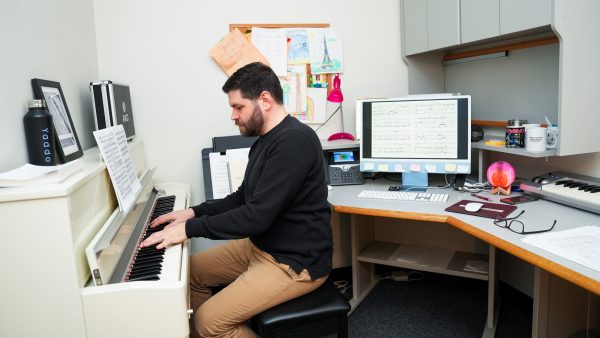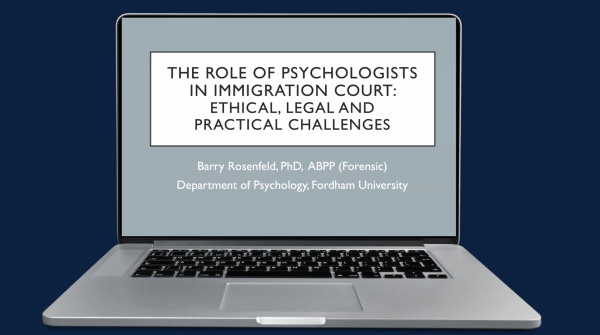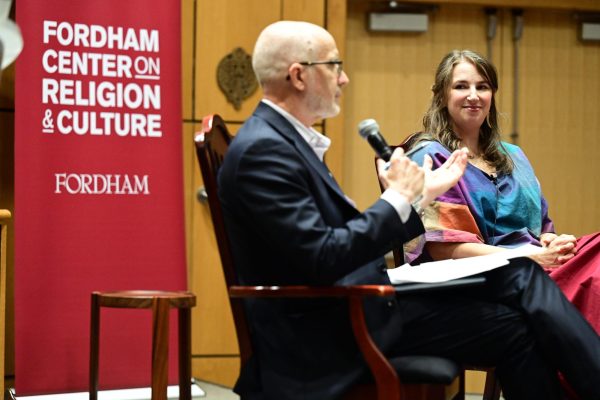Junior Studies Controversial Music From the 15th Century
Intrigued by a class discussion in his History of Music class with Professor Eric Bianchi, Jack McClatchy, FCRH ’21, decided to research colonial Latin American music from the Baroque period (1600–1750). Specifically, McClatchy looked at the Villancico de Negro, a Spanish language musical form often used for Catholic feast days, especially Christmas.
McClatchy said he was interested in the Villacico de Negro because it is often championed as an example of cultural exchange with Spanish composers collaborating with African influencers.
Unfortunately, McClatchy found in his research that there was little to no collaboration and was unable find records of Africans playing songs that were supposedly examples of the two cultures working together. There is also evidence of Spanish composers mocking the very people they were influenced by and using racial stereotypes in their music.
“It’s not black music, it’s what white Spaniards thought black music was,” said McClatchy. “And so I made comparisons to minstrel shows in the antebellum United States.”
In both cases, nearly 300 years apart, white oppressors took the music that slaves sang and performed them for white audiences.
“White Spaniards were taking African culture and putting it into Western musical forms,” said McClatchy. “Then they couple that with texts that are incredibly racist by a modern viewpoint.”
He said the points raised by the Villancico de Negro fit really well into a greater discussion of music and culture. McClatchy said his mentor and professor, Bianchi, teaches that music is not just a collection of notes, but that lots of thought goes into the composition and that thought is influenced by the society in which the composer grew up.
Currently, there is a debate in the academic field of music study over whether the compositions of Richard Wagner should be celebrated in the way they have been for centuries. McClatchy pointed out that Wagner was an unofficial composer of the Nazi Party in Germany and a favorite of Adolf Hitler.
“The music, when you look at it ideologically, it’s very ugly, but when you look at it aesthetically, at least for me, I find it very pleasurable, and it’s troubling for me to enjoy racist music as much as I am,” said McClatchy.
It is a struggle for McClatchy, a double major in political science and music, to reconcile the negative deeds of composers with their enjoyable music.
“There is no set definitive answer as to what we should do with Wagner, so I’m extending the debate to include more music that could be aesthetically pleasurable but is ideologically and culturally repugnant,” said McClatchy.
McClatchy explained other nuanced pieces in this musical debate and is conscious of his own identity as a white American studying cultural music.
McClatchy also pointed out that it is important to recognize the realities of the society in which music is composed. The Villancico de Negro society was one in which Africans were slaves and Spanish and Italian composers were oppressors. Mexican or Peruvian Latin American identities did not exist in the same way they do today.
“The music shows an intense desire from the small minority of white Spaniards in Central and South America to hold onto the power that they held in society by any means necessary,” said McClatchy.
As for the research process as a whole, McClatchy has thoroughly enjoyed it. He had an FCRH research grant over the summer and renewed it to finish his research this semester.
“I never felt like I was working when I was analyzing this music or I was reading a book or I was going over edits for the 10th time,” said McClatchy. “I felt like I was doing something tangible, and I wasn’t just doing it for a grade. I was doing it for something more important than that.”
He also highly recommended doing humanities research, especially in the fields of art and music.
“I would say to the student who’s interested in music or art, there’s still a lot that hasn’t been researched,” said McClatchy. “You can be on the cutting edge of an academic field in the humanities and just because you’re not researching a break through drug or some scientific process doesn’t mean you’re not doing meaningful work.”















































































































































































































